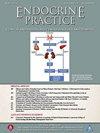电子会诊对糖尿病护理影响的系统综述。
IF 3.7
3区 医学
Q2 ENDOCRINOLOGY & METABOLISM
引用次数: 0
摘要
目的:初级保健医生(pcp)在管理糖尿病患者(PWD)的血糖控制方面面临越来越大的挑战,特别是在内分泌科医生短缺的情况下。为了解决这些问题,已经引入了电子咨询(e-consults),使pcp和专家能够通过电子健康记录进行异步通信。本系统综述旨在评估e-consults对PWD患者血糖控制的影响,重点关注HbA1c水平的变化。方法:两位独立审稿人按照PRISMA 2020指南检索PubMed、EMBASE和Cochrane Library。该综述包括随机对照试验(rct)和观察性研究。两名审稿人从每个纳入的研究中提取与每个兴趣的预先指定结果相关的数据。结果:采用汇总表和叙事综合法(PROSPERO 2024 CRD42024503278)。包括6项研究,2项随机对照试验和4项观察性研究,评估电子咨询在糖尿病护理中的作用。大多数研究没有报告电子咨询组和对照组之间HbA1c水平的显著差异。然而,也注意到诸如改善药物使用、降低成本、增加获得专科护理的机会、缩短亲自就诊的等待时间以及为pcp提供更好的教育机会等益处。实施障碍包括PCP对电子会诊医生的熟悉程度和患者依从性。局限性包括仅纳入两项试验和四项观察性研究以及它们之间的异质性。结论:电子会诊为糖尿病管理提供了宝贵的益处,特别是在资源有限的情况下。电子咨询为内分泌专家短缺提供了一个有希望的解决方案,尽管需要进一步的研究来确定哪种PWD最受益。本文章由计算机程序翻译,如有差异,请以英文原文为准。
A Systematic Review on the Impact of Electronic Consultations on Diabetes Care
Objectives
Primary care physicians (PCPs) are increasingly challenged with managing glycemic control in people with diabetes (PWD), especially in the setting of a shortage in endocrinologists. Electronic consultations (e-consults), which enable asynchronous communication between PCPs and specialists through electronic health records, have been introduced to address these issues. This systematic review aims to evaluate the impact of e-consults on glycemic control in PWD, focusing on changes in HbA1c levels.
Methods
Two independent reviewers searched PubMed, EMBASE, and the Cochrane Library, following Preferred Reporting Items for Systematic Reviews and Meta-Analyses 2020 guidelines. The review encompasses randomized controlled trials and observational studies. Two reviewers extracted data pertaining to prespecified outcomes of each interest from each included study.
Results
Summary tables and narrative synthesis were used (PROSPERO 2024 CRD42024503278). Six studies were included, —two randomized controlled trials and 4 observational studies—assessing the role of e-consults in diabetes care. Most studies did not report significant differences in HbA1c levels between e-consult and control groups. However, benefits such as improved medication usage, reduced costs, enhanced access to specialist care, shorter wait times for in-person visits, and better educational opportunities for PCPs were noted. Implementation barriers included PCP familiarity with e-consults and patient adherence. Limitations include inclusion of only 2 trials and 4 observational studies and heterogeneity between them.
Conclusions
E-consults provide valuable benefits in managing diabetes, particularly in resource-limited settings. E-consults offer a promising solution to the endocrinologist shortage, though further research is needed to identify which PWD would benefit most.
求助全文
通过发布文献求助,成功后即可免费获取论文全文。
去求助
来源期刊

Endocrine Practice
ENDOCRINOLOGY & METABOLISM-
CiteScore
7.60
自引率
2.40%
发文量
546
审稿时长
41 days
期刊介绍:
Endocrine Practice (ISSN: 1530-891X), a peer-reviewed journal published twelve times a year, is the official journal of the American Association of Clinical Endocrinologists (AACE). The primary mission of Endocrine Practice is to enhance the health care of patients with endocrine diseases through continuing education of practicing endocrinologists.
 求助内容:
求助内容: 应助结果提醒方式:
应助结果提醒方式:


